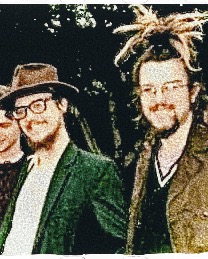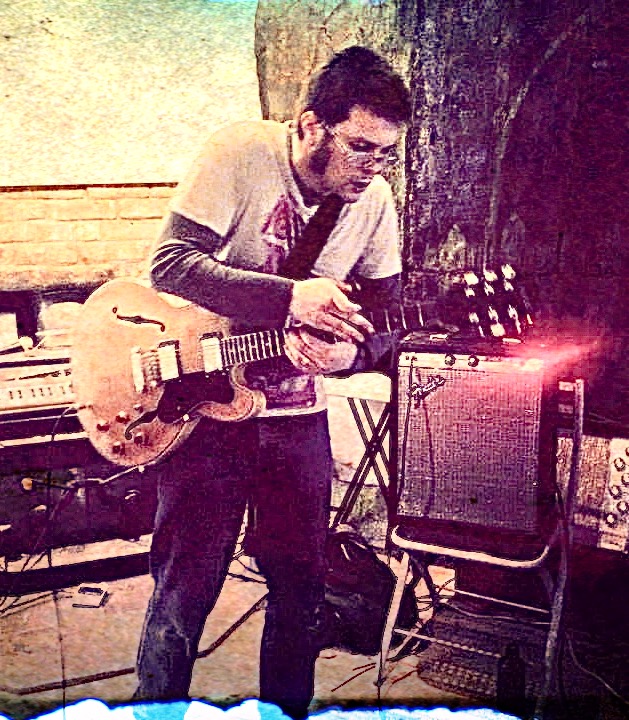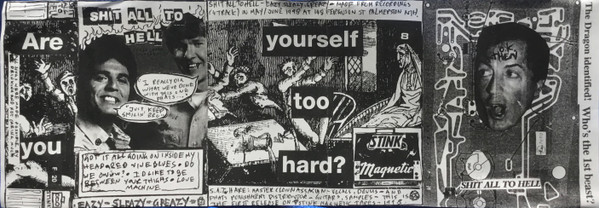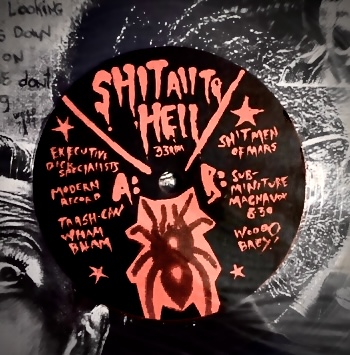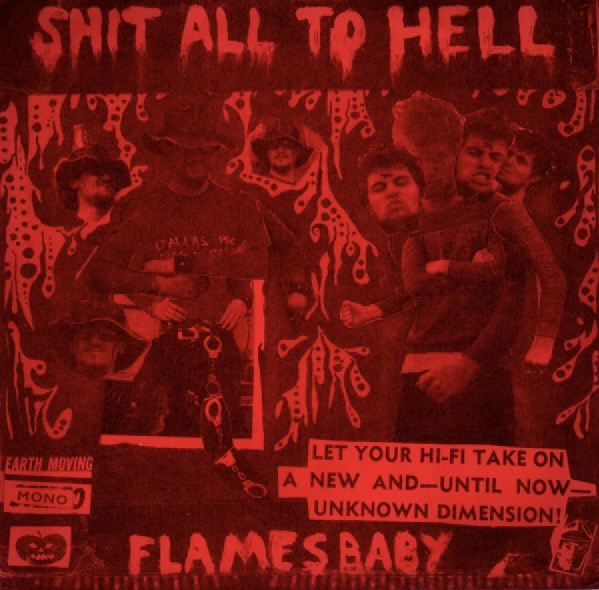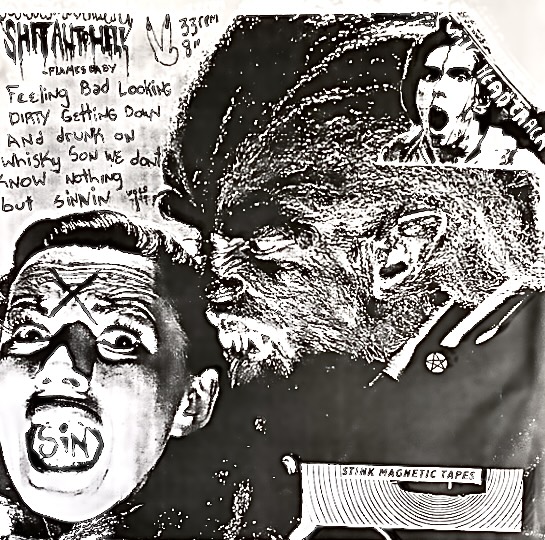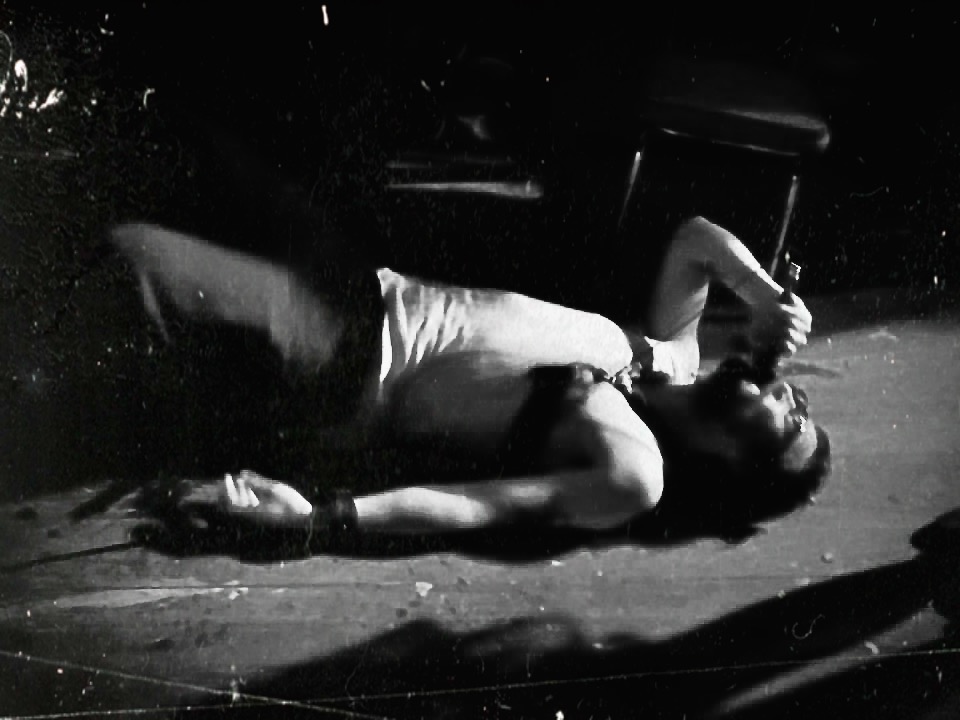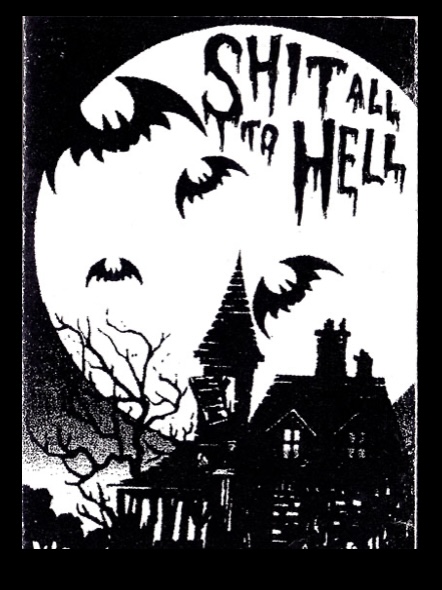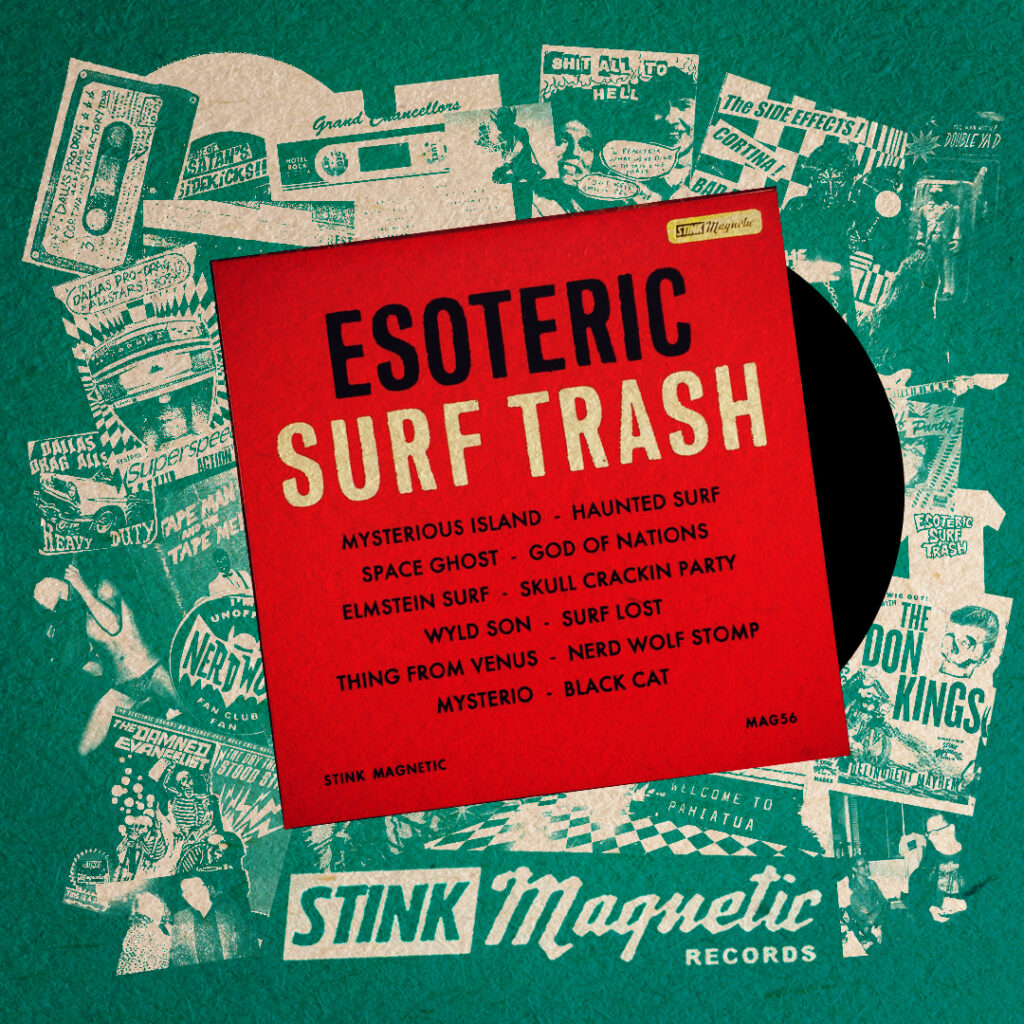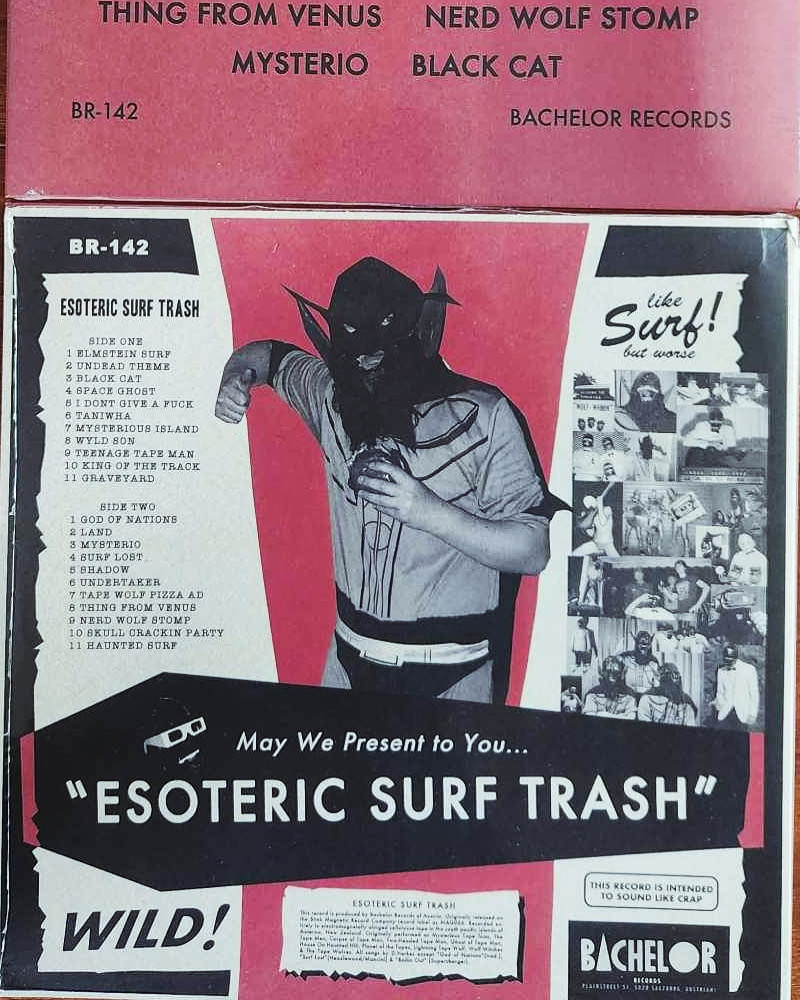The Side Effects
Artists: Dickos Fortuna, Boss Christ, Segue Lugosi, Oscr Trm and Trevlak
Time: 2000-2001
Refers to:
MAG 17 THE SIDE EFFECTS “Gold Apache”
Listen to The Side Effects “Wolfman”
Space— the infinite expanse of nothingness. Dusted with a thousand sparkling lights suspended in an endless volume of the unknown. The rhythm of the cosmos captured mid flight within a black canvas of the endless deep.

Here, among the countless drifts of dust and ice, among the shimmering rays of its sun, on a small island set at the edge of the sea, in a bustling city street of the nations capital we are drawn slowly to the unassuming entrance of a solitary motion picture theatre door ascending discreetly from a crowded footpath. As we climb its cola-stained carpet, measuring each step in its viscosity and surgery tack we reach the illuminated atrium– a hole-in-the-window ticket booth and complimentary candy bar. Vague figures swagger in the shadowed area of three cinema attendants conversing.
The three bow-tied loiterers, skirting duties of sweeping up after a thousand childrens spilt popcorn, are, at an average age of about twenty years — Dickos Fortuna, Boss Christ and Segue Lugosi. Over garbage bags dripping with discarded soda they consider the potentially catastrophic consequences of forming an instrumental combo.
Dickos Fortuna, the handsome pakeha native to the rural metropolis of Masterton, invoked a pivotal miscreancy to the Masterton teen scene of 1995. Where he had met and cajoled with the similarly untamed Boss Christ and Segue Lugosi of the lesser, more northern country township of Pahiatua. When Boss’ parents – Mr & Mrs Christ, relocated from Pahiatua to Masterton both Dickos and Boss alchemised a kinship in the shared enthusiasm for both rapscallion throng and complimentary audio experimentation.

Segue Lugosi, the lanky amateur double bassist, and Boss Christ – hairy Roman sandal welding guitarist, had both applied for the study of the modernist musical movement known as “jazz” at a Wellington University. Being from more rural origins and lacking in the general aptitude of the sophisticate, knowledge, experience and most things, were surprised to be accepted into the study and consequently to Hoyts Cinema for part time employment.
One summers evening in the year 2000, in a downtown brick ally way apartment housing Dickos Fortuna, the trio met to further discuss the pros and cons of SURF. It was THEN, in a routinely hedonistic high five, that an oath was perceived in the cosmos and special powers thusly bestowed upon them.
Once deep in the walls of academia, Boss and Segue happened upon a curious first — a relatable Aucklander. Their interest in both the alchemical and hypnotic aspects of ritualistic inebriation coupled with musical performance aligned suspiciously well. Oscar Trm, the organ wielding Aucklander who relocated to the windy city was an immediate and dependable ally in sonic exploration. With a penchant for the obtuse, the angular and the asymmetric a common curiosity between the players ensued.
A few weeks later, now armed with Oscr on a veneered Casio, Dickos and Boss on guitar and Segue on bass the intention for a combo to realise these ideas was close to ultimately manifest. All that lacked was a drummer who understood the kind of tribal swing and psychedelia essential to it.
The gods were listening. Days later Segue crossed the city street that ran straight down the hill toward the water when a drummer of a punk band he’d seen a year or so beforehand crossed the opposite way. It would be unbelievable if it wasn’t plain truth as the two exchanged greetings and got talking of the idea.
The name his mother gave him was unclear but the world knew him simply as “Trevlac”. He could have been a karate chopping secret agent but he was too handsome for war with an air that captivated a lustful yearning in most by the simple swish right of his sideburnt aviators or the sultry flop of his shaggy beatle bob set majestically aloft a wide collar of tanned pleather. Like the lost knickers torn away in a visceral southerly he appeared to jauntily float rather than walk. His drumming was equally impressive. He owned a drum kit and his own car and because of all of this he became the fifth and final member of what they were now calling THE SIDE EFFECTS.

In the following weeks the living room turned bedroom of an Art Valley flat became the headquarters where the five would test their various theories. Propositions were heavily rhythmic in nature, chiefly repetitive, at almost nauseating overuse between unknown spaces for cosmically “Freaking Out” — as it became paramount that it was essential to dwell psychedelically for the optimal “freak-out”. The resulting experience became 5 to 8 minute long songs branching into various colours as each player did whatever the hell they felt like within the motif of the proposal.
Shows began discreetly, tuxedo clad and to rooms of less than a handful outside of friends. Gradually, the live show appeared to work as a guaranteed “dance” performance— literally too rhythmic for anyone in the room to avoid at least a toe tap. In less than half a dozen shows they began to completely fill venues which bopped or boogied wildly for the entire hour long set. Occasionally catering to the additional dancer on stage or saxophone player. In fact, it soon became typical to see an entire room full of people, dancing in wild abandon.
A local sports bar named after the South Pacific star cluster Crux soon offered the band a weekly Wednesday night residency of which the band happily accepted for small pay, drinks and the chance to practice more. The bar was mostly catered to sports watching and slot machines during the day and at nights would occasionally host live music shows to various popularity. The residency was a shot at attracting some folks to an otherwise quiet mid week bar and word spread quick that the Side Effects performed there weekly for free while three dollars beers were served.
A few months into performing, Mike Fabulous of the band Star Factory assisted in recording them. The upstairs of the old community hall at the top of Cuba street was hired for space to record and the band brought in their own four track cassette recorder. The room was large and wooden as the band set up similarly to a show on the stage at one end of the cavernous space. The opposing emptiness of more than three quarters was a barren space except for the four track and a handful of pals. The resulting sound was hugely echoed with the faint woops of friends about the wooden reverb chamber. Everything was recorded live and in one take unless someone made a mistake that was obvious. The recording seemed more like a device for capturing the total experience of what was happening rather than any conventional kind of recording but on review the band approved and the result was their debut cassette album “Gold Apache”.

The bands reputation around Wellington in particular became notorious quickly and news spread out to surrounding towns of the psychedelic experience that is THE SIDE EFFECTS, and soon offering shows. As if the cosmos had echoed out the intention of the psychedelic frequency wranglers the universe made space for the cosmic combo to thrive. Strangely, a bush doof techno festival set in the remote South Island valley of Golden Bay asked the band to perform in their food tent resulting in the instigation of their one and only “tour”.
Travelling south in Boss Christ’s unregistered, unwarranted Bedford van named “The Swamp of Love” they boarded the Blue Bridge ferry south with a herd of cows. With no seats in the back and a van full of gear, two of the band had to travel squeezed in between amps and drums over the Takaka hill which was an experience in itself. Once arrived at the festival the band prepared for the show in the slot after legendary Flying Nun punk Chris Knox as weary rave bunnies staggered by, exhausted of nutrients. It was notable in that the show was generally ignored. However, the band was grateful for the gas money and the inspiration to tour in the South Island. After the show, someone asked Chris Knox what he thought about the Side Effects performance which he simply reviewed as “very silly”.
As the earth turned slowly once more to face its dominant star, the trauma of spending a night among thousands of chemically displaced uni students the band headed south in the Swamp of Love, down the West Coast toward Christchurch. After partially breaking down somewhere and them fixing it the Swamp of Love managed to roll in to the small mining village of Blackball where a large hotel called the “Hilton” stood. Surrounded by nothing but primitive nature the township appeared as a target for cosmic radiation. Like a n inverted radar translating messages from space the band knew it was more than fate calling them to the bar that night. Having partaken in a bout of refreshments the band got to enquiring to the custodian if they may be interested in a psychedelic surf band performing in the hotel in exchange for lodgings or meals. Th truth was that the band knew that it’s cosmic frequencies would be best amplified by such a place and the pleasure would be all theirs. The bar curiously agreed and the five weary tuxedoed travellers set up with all drinks and meals supplied. At 6pm the sonic emissions ensued for a total of exactly one family of four politely eating dinner at the Blackball Hilton that night, kindly leaving their seats post desert to twist and shake the rest of the night family-style about the band.
That night the echos from the Blackball Hilton rose up toward the clear starry sky piercing through the stratosphere and out into the vacuum of the solar system. At precisely 7:13pm, after a brief intermission for refreshments, the intensity of the resulting emanation formed a natural waveform of both sonic and light waves that penetrated out into a new void recently carved into into the southern portion of the moon. The resulting concave depression consequently acted as an echo chamber, collecting the incoming waveform and projecting them further at an angular pitch toward the rising planet Venus. Later, scientists would discover a type of amalgamated mineral so rare that it would only be found in this quantity and in this exact location. The discovery would lead to a Millenia old puzzle confounding future minds for generations. Incredibly, the next day, the Swamp of Love made it to Christchurch where the band performed with the Hi-Tone Destroyers before successfully returning back to the North Island again.
It was shortly afterwards that the two guitarists, Dickos and Boss would have to move out of Wellington leaving the band with just the bass, organ and drums who would go on to continue as a new formation and attempt to further the sonic explorations initiated by The Side Effects.
— Segue Lugosi

